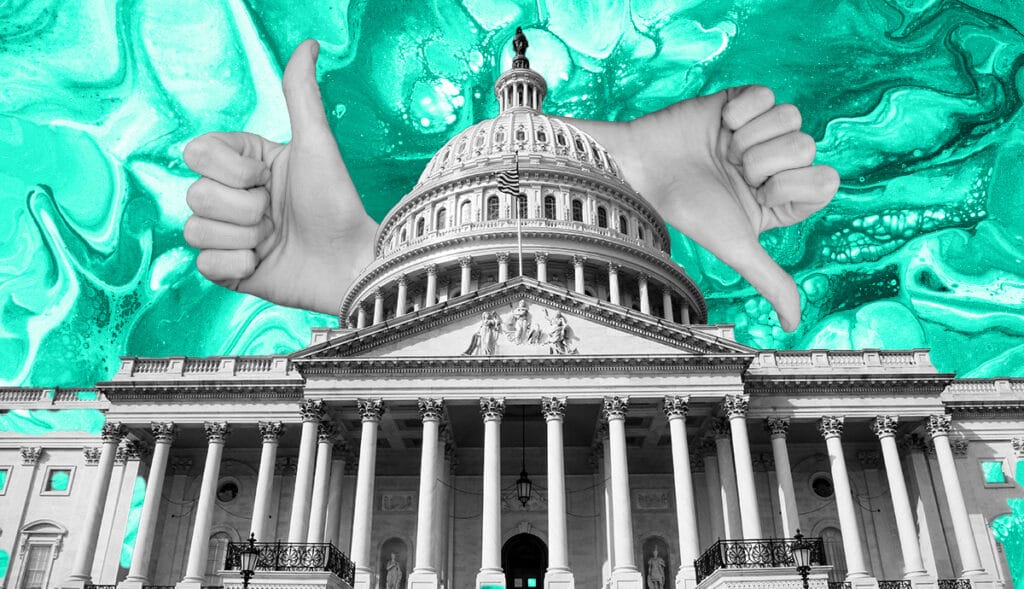MAPS/Lykos’ MDMA trials for PTSD delivered overwhelmingly positive results. I thought that mattered until I sat through a nine-hour deliberation among the FDA’s Psychopharmacologic Drugs Advisory Committee on June 4, including two hours of public comments that skewed anti-Lykos.
After a long day of groupthink, the panel advised the FDA that MDMA therapy was neither safe nor effective for patients with PTSD. And while their vote is nonbinding, their opinion significantly impacts the FDA’s final decision on Lykos’ new drug application.
So, how did the committee come to be? Were they up to the task of reviewing this historical application? And were their votes intellectually honest, given the failing mental healthcare system in the United States?
Psychopharmacologic Drugs Advisory Committee: Who Are They?
The Psychopharmacologic Drugs Advisory Committee (PDAC) consists of experts who provide independent advice to the FDA on the safety and efficacy of investigational drug products for psychiatric disorders. It consists of nine core voting members, including psychiatrists, neuropsychiatrists, consumer representatives, patient representatives, and one non-voting member, typically an industry representative.
Anyone can nominate themselves or others to PDAC. However, the FDA ultimately identifies and appoints candidates based on what they perceive as relevant expertise. Members serve one to four-year terms and attend several drug review hearings throughout the year.
The FDA also invites temporary voting members to certain meetings, bringing specialized expertise to address knowledge gaps in the core group. For the MDMA review, the FDA appointed six temporary members. But curiously, not one of them had specialized knowledge of psychedelic research or medicine.
Only one permanent PDAC voting member, Dr. Walter Dunn, holds a relevant background in psychedelic research. Dr. Dunn was also the only person to dissent from popular opinion, voting yes on both final questions:
- Do the available data show that the drug is effective in patients with posttraumatic stress disorder?
- Do the benefits of midomafetamine (MDMA) with FDA’s proposed risk evaluation and mitigation strategy (REMS) outweigh its risks for the treatment of patients with PTSD?
I don’t think the FDA purposely stacked the group against Lykos. But the committee’s lack of psychedelic expertise was grossly negligent, given the FDA’s goal of selecting experienced field experts. This novice lineup set the stage for a lopsided debate dominated by well-meaning status quo advocates who weren’t ready to unleash a transformative medicine they didn’t understand.
Kim O. Witczak, PDAC consumer representative, put it this way:
“Once you let the genie out of the bottle, you can’t put it back in.”

The Unprecedented Nature of the MDMA Review
To be fair, the committee faced an incredibly challenging task of reviewing the FDA’s first-ever new drug application (NDA) for a psychedelic compound.
Members received a data packet with MAPS clinical trials findings and the FDA’s concerns prior to the meeting. They may have also reviewed the critical ICER report and citizen petition that prompted the hearing. Together, these documents feasibly served as their first foray into psychedelic medicine before casting incredibly consequential votes affecting 13 million Americans with PTSD.
Additionally, it was the first NDA that merged a medicine, MDMA, with psychotherapy. The FDA does not regulate psychotherapy, so the committee had never seen such a proposal before. Until the MAPS MDMA trials for PTSD, they had only ever reviewed standalone prescription drugs.
This dual application caused distress and confusion as panelists struggled to reconcile their mandate with their desire to oversee the therapeutic aspect outside their jurisdiction. Admittedly, they were out of their wheelhouse, operating under a framework that didn’t adequately address the task at hand.
“Maybe it’s time to say we have to look at the current way that we’ve always approved and reviewed drugs differently,” Witczak said.

Resistance to the Therapeutic Component
With confusion looming, Lykos’ patient-directed therapy model was central to the panel’s skepticism throughout the hearing. They consistently questioned its validity and whether psychotherapy was even necessary alongside MDMA to alleviate PTSD.
In my discussion with Witczak, she reiterated the concerns that Lykos’ protocol wasn’t tested against “recognized therapies” or no therapy at all, leading to doubts about its credibility.
She’s right that Lykos didn’t compare its MDMA-AT model to status quo approaches, like Prolonged Exposure. They also didn’t study an MDMA-only group.
In hindsight, they should have, given the panel’s doubt about alternative therapies amplified by public accusations that Lykos is a therapy cult imposing spirituality onto patients. But hindsight won’t help now. At the time of the trial, the FDA had approved the inner healer method. Also, though Lykos didn’t explicitly test mainstream therapies, scientific data give us a clear picture of their effectiveness, according to Dr. Scott Shannon, Principal Investigator in MAPS Phase 2 and 3 clinical trials. Spoiler alert: mainstream therapies are not performing great.
“Psychotherapy does something [for PTSD] but not that much,” said Dr. Shannon, who co-signed an open letter advocating for MDMA-AT’s safety and efficacy.
According to Dr. Shannon, about 50% of people in PTSD psychotherapy trials drop out immediately, and of the 50% that pursue it, only half get better.
“Our medications are even worse,” he said, adding that PTSD medicine hasn’t had a significant innovation in the last 23 years, and up to 17 veterans are taking their lives daily as a result.
Still, PDAC insisted that Lykos’ therapy was a significant X factor that might not be effective or safe.

Therapeutic Safety
A confirmed case of therapist misconduct within MAPS clinical trials exacerbated the panelists’ pushback. The case involved Meaghan Buisson, a participant in the phase-two trial, who filed a lawsuit against two MAPS therapists, Richard Yensen and Donna Dryer, alleging sexual assault and professional negligence. Buisson’s claims included video evidence showing the therapists physically restraining and spooning her during a session. Buisson moved near the therapists after the trial, where she alleges the abuse continued.
I’m not here to defend the therapists’ actions. I watched the MDMA session clip and was not ok with what I saw. I’m also uninterested in conjecture about what occurred between Buisson and Yensen after the clinical trial ended. No matter the details, this situation is a stain on the program, and the public needs to know about it so we can hold people accountable and prevent future harm.
At the same time, this inexcusable case does not erase MDMA-AT’s profound impact. For instance, Lykos’ second Phase III trial found that 71.2% of the MDMA cohort no longer held a diagnosis, compared to 47.6% in the placebo group. Additionally, its MDMA trials for PTSD had some of the lowest dropout rates in history.
We need to be able to hold two truths at once.
1. Psychotherapist misconduct is unacceptable. We must continue raising ethical standards, recording therapy sessions, and holding offenders accountable for their actions.
2. At the same time, about 7% of conventional male therapists admit to having sex with at least one patient, and no one is suggesting we ban talk therapy as a result. Lykos’ misconduct case represents a lower risk profile than the status quo, and people with PTSD deserve a treatment that works.
And not to beat a dead horse, but Dr. Shannon reminded me that the FDA has no mandate or interest in regulating psychotherapy. State licensing boards, professional associations, and the legal system assume that role.
Ultimately, the panel and public debated an issue that the FDA likely won’t factor into their final decision.

Broader Issues of Mistrust in the MAPS Clinical Trial
The FDA cares about drug safety and efficacy data. But the panel’s broad dialogue extended well beyond the numbers into downright mistrust.
“I was surprised because usually [a drug] is approved more quickly, or [the panel] doesn’t raise many concerns. But this meeting had much more discussion,“ said Witczak, who added that it was “good conversation.”
Another committee member said, “It felt strange to vote no when the p-value started with three zeros.”
A low p-value, typically below 0.05, suggests that the results did not occur by random chance. So, a P < 0.0001 value – which was present in the MAPS clinical trial – is extraordinarily statistically significant.
Members cited functional unblinding (inadvertent awareness of group assignments) and expectation bias (preconceived notions about MDMA) as reasons why they didn’t believe the results. Additionally, they floated rumors from the citizen petition that the trial’s principal investigators and therapists engaged in data manipulation.
I’ll be honest. I wondered whether their points held weight, given the fact that most people in the MDMA group knew they were on MDMA.
Dr. Shannon explained that despite functional unblinding, the trial exhibited a significant effect size of 0.9. Effect size quantifies the magnitude of the treatment’s impact compared to placebo. Moderate effect sizes range from 0.4 to 0.6, according to Dr. Shannon, who explained that the best we for current SSRIs is a dismal 0.23.
“Even if our (MDMA-AT) effect size only turned out to be half of what we measured, it’s still much better than [the current treatments],” said Dr. Shannon.
But what about the potential fraud in MDMA trials for PTSD?
“I know several sites, and I know they did nothing untoward, nothing malicious, nothing underhanded. We knew we had to perform at the highest level of ethical and scientific investigation, and that’s what we did.”
Dr. Shannon added that FDA investigators were at his site for a week and had visited most sites throughout the clinical trial.
“We have been scrutinized to a high degree and stand by our data.”
Dr. Shannon could be wrong about the integrity of other actors in the trial. Some shenanigans may have occurred, and if they did, we need to question every single outcome.
However, such accusations are grave and rely on the FDA to investigate and determine their validity. The advisory panel meeting was not the format to litigate, yet the panel members clearly factored these stories into their votes.
Trying to Keep the Genie in the Bottle
MDMA-assisted therapy will revolutionize mental health treatment and society as we know it. I see that as broadly beneficial and necessary. But what do I know? I’m just one anecdote.
The data matter more than my opinion or that of any naysayer. But almost no committee member could speak to it with authority or provide any context on decades of historical MDMA therapy use. Without such a person, I witnessed the panel circle the drain in unison until they concluded they weren’t ready to let the genie out of the bottle.
I believe most members voted no out of genuine concern, like Watzeck, who said she entered the meeting with hope and optimism before the pervasive criticism impacted her vote. But others may have arrived with a pre-packaged vote.
“I would say some probably had biases. They may never agree to [MDMA therapy],” said Watzeck.
And that right there encapsulates why a committee hearing stacked with psychedelic novices could not come to an intellectually honest decision despite what may have been an utterly genuine effort.

Why the Political and Social Reality Might Supercede the Rejection
Fortunately, the FDA’s decision is not made in a vacuum.
Witczak thinks the FDA may still approve MDMA-AT despite the panel’s concerns because of pressure from veterans groups and Congress to deliver effective PTSD therapies.
Dr. Shannon also thinks that the FDA will consider MDMA because of the dire need for innovation in mental health treatment. He believes the FDA will likely impose safety restrictions, like a limited rollout, enhanced data collection, and a Risk Evaluation and Mitigation Strategy (REMS) program. Still, he thinks the organization will ultimately say yes.
The FDA decision whether to approve or deny MDMA therapy is expected to be announced by Aug. 11.
“We’re in a paradigm shift from either a psychotherapy or a pharmacology model, which have grave limitations, into a new model that combines them both,” Dr. Shannon said.
I’d like to agree, but I suspect the FDA is filled with well-meaning experts who fear unleashing the unknown.
I hope I’m wrong.


